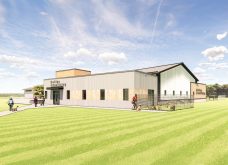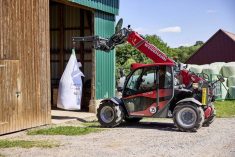SomaDetect has received $3.9 million in funding from Sustainable Development Technology Canada to test its in-line milk sensor technology.
The company, with offices in Canada and the U.S., is working to develop a system that uses a sensor in the milk line to automatically measure milk fat and protein, somatic cell count, progesterone and antibiotics.
It needs no consumables and means no lost milk. It relies on machine learning to increase its power and reliability. Farmers can receive information every day instead of waiting for lab samples to be sent away, be tested and information returned.
Read Also

BinSentry sensors reduce feed-bin outages
BinSentry sensors mean fewer feed bin outages and more efficient deliver for feed mills.
“We are thrilled to have SDTC join us and support the wild adventure that is SomaDetect,” said Bethany Deshpande, CEO of SomaDetect.
Her father figured out the basics behind the technology when the family was living in Guelph.
The technology says it also has the potential to help with milk quality tracking and traceability and could improve the life of cows with automated reproduction testing reducing the need for inoculations and manual pregnancy testing.
A release announcing the agreement between SomaDetect and SDTC also said the technology could help reduce greenhouse gas emissions from dairy farms by making them more efficient.
“SomaDetect has created a sensor that will measure dairy quality, ultimately resulting in a five to eight per cent reduction in associated GHG emissions in dairy farms,” SDTC CEO Leah Lawrence said, describing the reduction as equivalent to burning over 280 million pounds of coal.
SomaDetect’s proprietary technology uses deep learning algorithms to process the information collected by their sensors and a user interface to communicate to farmers actionable data. This data helps to manage their operations, including several aspects of milk quality and herd health.
This project allows the company to scale its works with dairy farmers and industry partners across North America. The company will be installing their sensors and collecting data to build algorithms on dairy farmers first in North America and then globally.
“The projects announced today will bring about the kinds of innovative cleantech solutions that we need in the fight against climate change,” said Navdeep Bains, minister of innovation, science and economic development.














